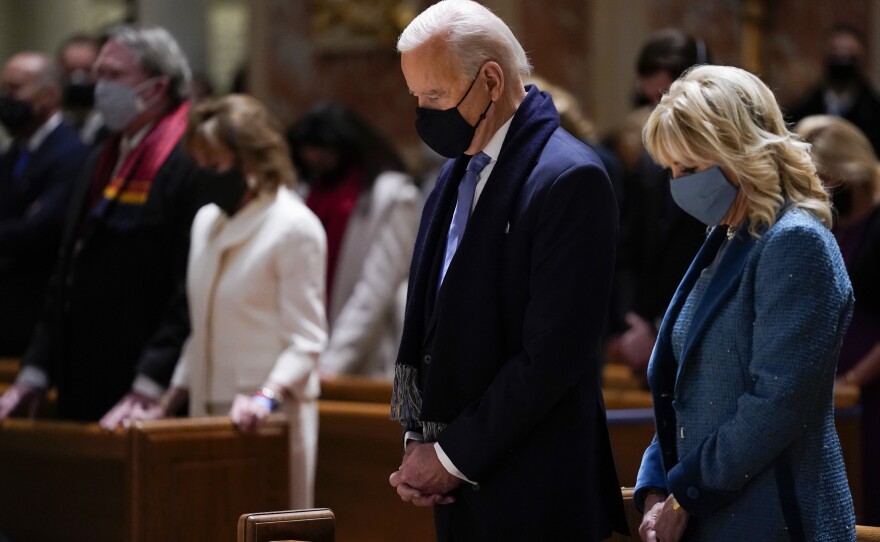After a contentious debate, the U.S. Conference of Catholic Bishops has voted to move forward with a process that could call into question the eligibility of politicians like President Joe Biden to receive Communion.
The bishops voted 168-55 in favor of drafting "a formal statement on the meaning of the Eucharist in the life of the Church," officials announced on Friday afternoon, the final day of their three-day virtual meeting. Six bishops abstained.
Biden's election as only the nation's second Roman Catholic president has prompted renewed debate over denying communion to Catholic politicians who support abortion rights, a position at odds with church teachings.
During their online meeting, bishops held a spirited discussion Thursday before voting on the proposal to direct the bishops' Committee on Doctrine to draft the statement. Such a document, once completed, could include guidelines for denying communion to public officials.
A Catholic president has become a lightning rod for debate
Biden was mentioned by name or alluded to several times, including by Bishop Liam Cary of the Diocese of Baker in Oregon, who described what he sees as an "unprecedented situation in the country."
"We've never had a situation like this where the executive is a Catholic president opposed to the teaching of the church " Cary said.
Archbishop Joseph Naumann of Kansas City, who leads the bishops' Committee on Pro-Life Activities, has been among the most vocal critics of Biden's support abortion rights. He said he's disturbed by Catholic officials who "flaunt their Catholicity" while publicly taking positions on abortion that conflict with those of the church.
"This is a Catholic president that's doing the most aggressive thing we've ever seen in terms of this attack on life when it's most innocent," Naumann said.
Other bishops urged caution, echoing a warning from the Vatican that moving forward with the document could politicize the sacrament of Holy Communion and risk deepening divisions among American Catholics, at a time when many are just beginning to return to in-person worship.
"Bishops now want to talk about excluding people at a time when the real challenge before them is welcoming people back to the regular practice of the faith, and rebuilding their communities," Cardinal Blase Cupich of Chicago warned.
Bishop Robert Coerver of Lubbock, Texas, described what he saw as a rush to address the issue, and suggested that the debate was being clouded by concerns about upcoming elections.
"I can't help but wonder if the years 2022 and 2024 might be part of the rush," he said. "And I think we need to be real careful not to get embroiled in the political situation."
Soon after, Bishop Thomas Daly of the Spokane Diocese expressed skepticism about calls by some bishops for more time to discuss the matter and engage in dialogue with officials who support abortion rights.
"There is an aggressiveness in a number of elected officials, and this call for dialogue," he said "Sometimes I wonder if the dialogue is meant not truly to listen but to delay."
The bishops' vote concerns what is largely a procedural step – but one fraught with debate, given larger disagreements over how church leaders treat public officials who take positions at odds with those of the Catholic Church. Those decisions currently are left to local bishops.
About two-thirds of American Catholics believe Biden should be allowed to receive Communion, according to a survey by the Pew Research Center released in March. But many Catholics – like Americans in general – are starkly divided on the issue by party; more than half of Catholics who also identify as Republicans said Biden should not be allowed to receive the sacrament because of his views on abortion.
Discussion of who can receive the sacrament has a long history
The issue of who is eligible to receive the sacrament also has divided U.S. Catholic Bishops; several have called for denying communion to Biden and other prominent Roman Catholic officials who take positions on abortion at odds with those of the Catholic church, while others have argued the Eucharist should not be used to advance political goals.
Church leaders have expressed concerns about declining Mass attendance, and how well parishioners understand the full meaning and significance of the sacrament. In 2019, only about one third of American Catholics surveyed by Pew said they believed the church's teaching known as "transubstantiation" – or the idea that during communion, the bread and wine become the body and blood of Jesus Christ. Instead, most Catholics said they saw the sacrament as symbolic. According to church teaching, Catholics are expected to be free of any significant, unconfessed sin and in what's known as a "state of grace" when receiving communion.
Similar discussions have arisen before, most notably when Democrat John Kerry, also a Roman Catholic, was running for President in 2004. The debate resurfaced surrounding Biden's run for President in 2020.
Biden, only the nation's second Catholic president, was endorsed by Planned Parenthood and other abortion rights groups during his presidential run in 2020. The year before, he pleased abortion rights advocates by ending his longtime support for the Hyde Amendment, which prohibits federal funds from being used to pay for abortions for low-income women, in most cases.
The three-day meeting, which is being held virtually due to the coronavirus pandemic, ended on Friday afternoon.
Preparation of a new statement on the meaning of the Eucharist is only a first step; the bishops would have an opportunity to amend the proposed document at a future meeting before voting on whether or not to approve it. They're scheduled to meet again in person in November.
Copyright 2021 NPR. To see more, visit https://www.npr.org.






